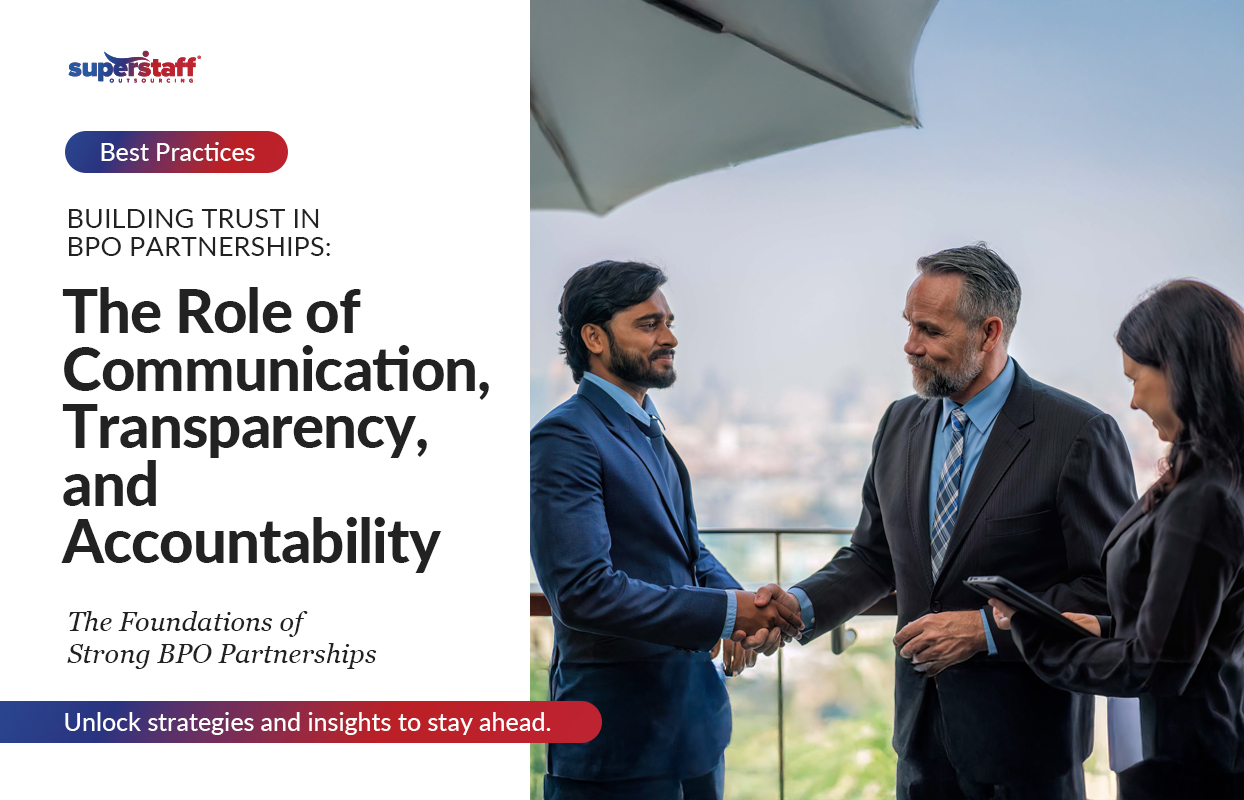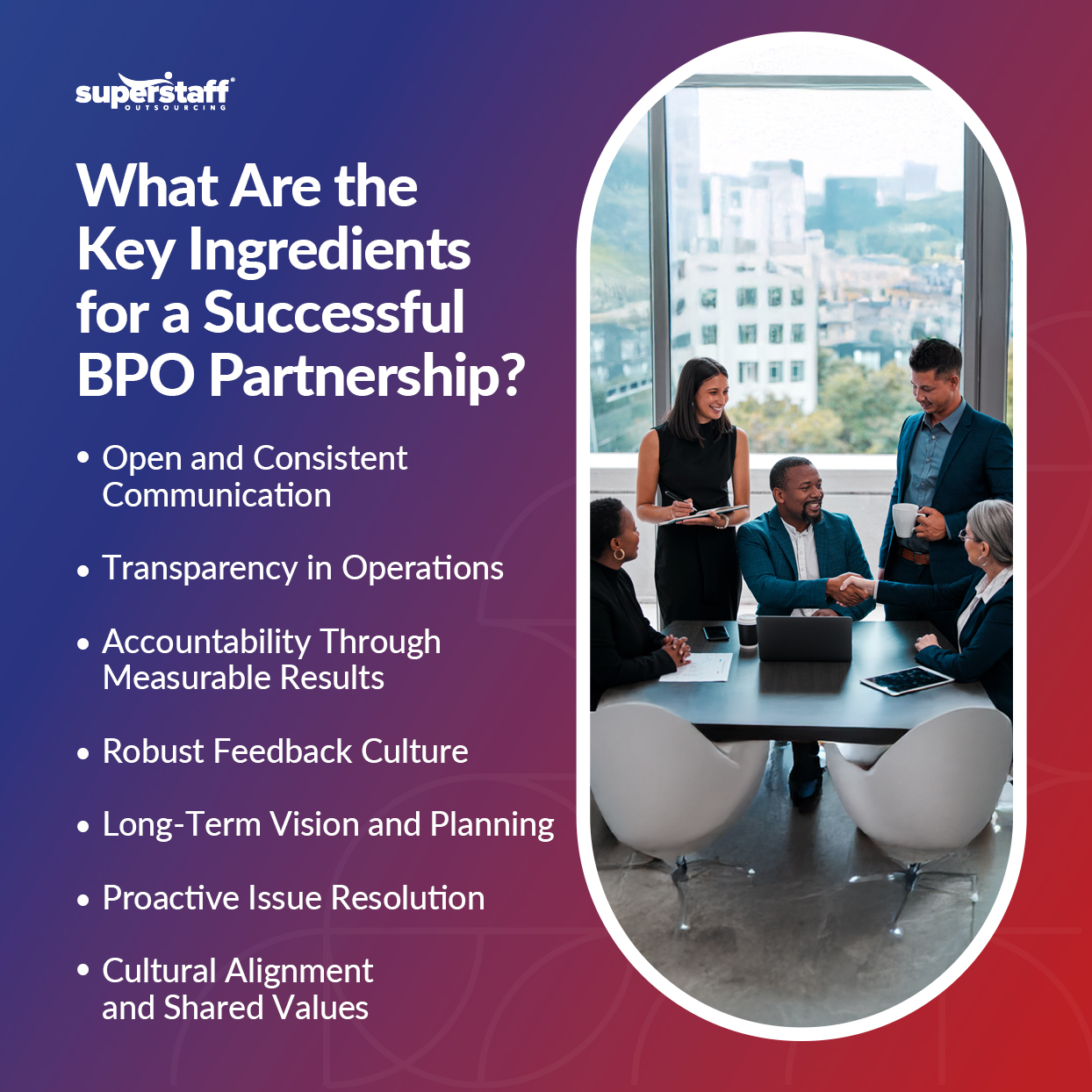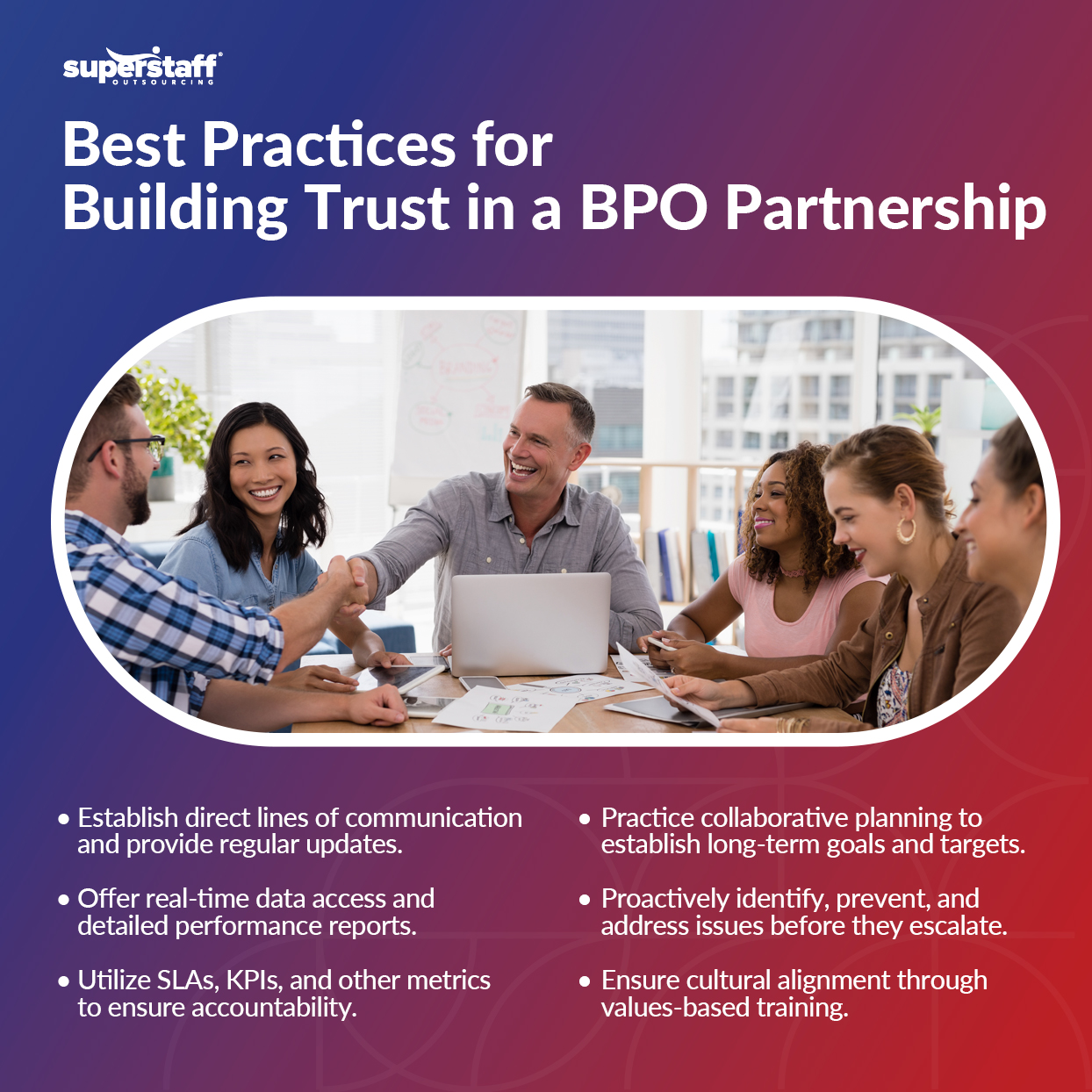
Outsourcing your call center operations is more than a business decision—it’s a leap of trust. You’re handing over a crucial part of your customer experience to a partner halfway across the world.
What if they don’t align with your brand’s values? What if you lose control over service quality? These concerns are valid and precisely why trust is the foundation of any successful BPO partnership.
Trust isn’t built on promises—it’s earned through open communication, radical transparency, and unwavering accountability. When your outsourcing provider operates as a true extension of your brand, you don’t just save costs—you gain a partner invested in your success.
But how do you ensure your BPO partner delivers on these promises? Let’s break down the key elements that make outsourcing a seamless, high-value partnership.
How to Build a Strong Foundation for a BPO Partnership

Building trust with clients in a BPO partnership starts with a foundation of clear communication, transparency, and accountability. Regular updates, open reporting, and real-time access to performance metrics ensure that businesses stay informed and in control.
Transparency in pricing, processes, and expectations eliminates uncertainty, while a commitment to accountability—through measurable KPIs, service level agreements (SLAs), and continuous feedback loops—reinforces reliability.
When a BPO provider prioritizes these elements, they don’t just fulfill a service contract; they build a long-term, trust-driven relationship that drives business growth and customer satisfaction. Let’s break down each element that contributes to a long-lasting and mutually beneficial outsourcing relationship:
Open and Consistent Communication
According to a McKinsey study, effective communication can radically improve productivity, reaping an increase of over 25%. The same is true for building long-lasting and successful outsourcing relationships.
Open and consistent communication is the backbone of successful BPO partnerships. It ensures alignment between the outsourcing provider and the client, preventing misunderstandings and inefficiencies. Regular check-ins, real-time reporting, and open feedback loops help maintain service quality and adaptability.
When businesses and BPO teams stay connected, issues are resolved faster, expectations remain clear, and customer satisfaction improves. More than just exchanging information, effective communication builds trust, fosters collaboration, and strengthens the long-term relationship between partners.
Weekly Check-Ins
Weekly check-ins play a crucial role in strengthening BPO partnerships by ensuring continuous alignment and accountability. These regular touchpoints provide an opportunity to review performance metrics, address concerns, and refine strategies in real-time. By fostering open dialogue, the client and the BPO provider can proactively resolve issues before they escalate, keeping service quality high.
Additionally, weekly meetings reinforce transparency, build rapport between teams, and create a collaborative environment where feedback drives improvement. Over time, this consistency strengthens trust, making the partnership more resilient and results-driven.
Performance Updates
Beyond weekly check-ins, performance updates are essential in the BPO industry to maintain transparency, accountability, and continuous service improvement. Regular reporting on key performance indicators (KPIs), service level agreements (SLAs), and customer satisfaction metrics ensures that both the client and the BPO provider stay aligned on goals.
These updates help identify trends, address potential issues early, and optimize processes for better efficiency. By providing clear insights into performance, BPO providers demonstrate reliability and commitment, reinforcing trust and strengthening long-term partnerships.
Open Forums
In addition to regular performance updates, open forums play a vital role in fostering collaboration and trust in BPO partnerships. By creating a space for honest discussions, feedback, and problem-solving, these structured conversations encourage both the client and the outsourcing team to share insights, address challenges, and brainstorm improvements in real-time.
Open forums also promote transparency and inclusivity, empowering agents to voice concerns, suggest innovations, and feel more invested in the partnership’s success. When businesses and BPO providers engage in open dialogue, they strengthen alignment, enhance service quality, and build a culture of continuous improvement.
Transparency in Operations
Yet, communication alone isn’t enough; transparency in operations further cements trust. When outsourcing providers openly share performance metrics, pricing structures, and operational processes, clients gain confidence in the partnership because they see and understand how goals are achieved. Clear reporting on key performance indicators (KPIs) and service level agreements (SLAs) eliminates uncertainty and allows businesses to make data-driven decisions.
Transparency fosters proactive problem-solving, prevents misunderstandings, and ensures continuous service improvements. By prioritizing openness, BPO providers build long-term relationships in which clients feel in control, valued, and assured that their outsourcing strategy aligns with their business goals.
Data Access
Are you wondering how to build trust with a client? Access to real-time data is a key driver of transparency in BPO partnerships, giving businesses complete visibility into performance, efficiency, and service quality. When clients can monitor key performance indicators (KPIs), agent productivity, and customer interactions through dashboards and reports, they stay informed and in control.
This openness builds trust, eliminates guesswork, and enables proactive decision-making. Additionally, transparent data-sharing practices ensure accountability, allowing both parties to identify challenges, track progress, and implement continuous improvements. By prioritizing data access, BPO providers strengthen client confidence and create a foundation for long-term, results-driven collaboration.
Detailed Process Reports
Aside from data access, detailed process reports are essential for maintaining strong BPO partnerships. They provide a clear, data-driven view of performance, efficiency, and service delivery. Regular reports on key performance indicators (KPIs), service level agreements (SLAs), and workflow progress ensure the client and provider stay aligned on expectations and goals.
These reports highlight successes and identify improvement areas, enabling proactive adjustments to enhance service quality. Offering transparency and measurable insights, detailed process reports build trust, foster accountability, and strengthen long-term collaboration between businesses and their BPO partners.
Process Visibility
Beyond process reports, process visibility is crucial in ensuring alignment, trust, and operational efficiency between the client and provider. Businesses with real-time access to workflows, performance metrics, and service updates can make informed decisions and maintain control over outsourced operations.
Clear visibility into processes helps identify inefficiencies, track key performance indicators (KPIs), and implement continuous improvements. It also fosters transparency, reduces uncertainty, and reinforces accountability. BPO providers who prioritize process visibility create a collaborative environment where clients feel confident in the partnership and the long-term success of their outsourcing strategy.
Accountability Through Measurable Results
Transparency is key, but without accountability, trust can quickly erode. A strong BPO partnership thrives on accountability, where providers take full responsibility for delivering results, meeting deadlines, and maintaining service quality. This means actively monitoring performance, promptly addressing concerns, and implementing corrective actions when needed.
Clients rely on outsourcing providers to uphold their brand reputation, and accountability ensures that any gaps in service are swiftly identified and resolved. Without it, miscommunication and inefficiencies can lead to poor customer experiences and missed business opportunities. By fostering a culture of accountability, BPO providers demonstrate reliability, build trust, and reinforce their role as a true extension of the client’s operations.
Service Level Agreements (SLAs) and Key Performance Indicators (KPIs)
Service-level agreements (SLAs) and key performance indicators (KPIs) are measurable benchmarks that define success in BPO partnerships. These metrics ensure that the client and provider have clear expectations regarding response times, resolution rates, customer satisfaction, and other critical performance factors. Holding the team accountable to SLAs and KPIs shows dedication to performance standards.
By consistently tracking and meeting these targets, BPO providers prove their commitment to delivering high-quality service. Regular performance reviews and data-driven insights help identify trends, optimize processes, and drive continuous improvement. When a BPO provider consistently meets or exceeds SLA and KPI targets, it reassures clients that their outsourcing investment yields tangible, reliable results.
Performance Evaluations
Once SLAs and KPIs are set, performance evaluations are needed to maintain accountability in BPO partnerships and ensure consistent service quality, efficiency, and client expectations. Regular assessments of key performance indicators (KPIs) and service level agreements (SLAs) help identify strengths, address weaknesses, and drive continuous improvement.
By conducting structured performance reviews, both the client and the BPO provider can align on goals, adjust strategies, and reinforce accountability at every level. These evaluations also create a culture of transparency, where teams are motivated to uphold high standards and proactively resolve issues. When accountability is reinforced through performance tracking, businesses gain confidence in their outsourcing partner’s ability to deliver long-term, sustainable results.
Feedback and Open Dialogue for Continuous Improvement
Accountability extends beyond metrics; feedback also plays a significant role. A robust feedback culture between client and BPO fosters trust through continuous improvement. When both parties regularly exchange feedback—whether through open forums, suggestion boxes, or direct interactions—it ensures that expectations are clear, concerns are addressed, and processes are optimized in real time.
A strong feedback loop provides visibility into operations for the client, ensuring that their brand values, customer service standards, and business goals are consistently met. When clients see their insights being acted upon, they gain confidence in the BPO provider’s responsiveness and commitment to delivering high-quality service.
For the BPO provider, ongoing feedback allows them to fine-tune their approach, enhance training programs, and proactively address challenges before they escalate. It also encourages a team accountability culture, continuously motivating agents to improve and adapt to client needs.
Ultimately, a feedback-driven partnership builds a foundation of transparency, responsiveness, and a shared commitment to excellence. Rather than a transactional outsourcing arrangement, it evolves into a collaborative relationship where both sides work together toward long-term success.
Regular Feedback Sessions
According to Forbes, regular reviews and feedback sessions can help address any disparities that may arise in partnerships, ensuring alignment and mutual satisfaction. These sessions create a structured opportunity to review performance, address concerns, and refine strategies in real-time. By actively listening to client insights and implementing necessary adjustments, BPO providers demonstrate their commitment to meeting expectations and delivering high-quality service.
Feedback sessions also empower agents to share their experiences and suggest process improvements, fostering a culture of collaboration and accountability. When both sides engage in open and constructive dialogue, they strengthen transparency, reinforce trust, and create a more adaptable and results-driven outsourcing partnership.
Open Forums and Suggestion Boxes
Beyond direct feedback sessions, suggestion boxes and open forums foster a strong feedback culture within BPO partnerships, creating an environment where clients and agents feel heard and valued. Suggestion boxes provide a structured way for employees to share ideas, voice concerns, and propose improvements without fear of judgment, encouraging continuous innovation and problem-solving.
Open forums, on the other hand, facilitate real-time discussions, allowing for transparent dialogue between leadership, teams, and clients. These platforms promote a two-way communication flow, ensuring that feedback isn’t just collected but actively addressed. Through encouraging open participation, BPO providers build trust, enhance engagement, and drive meaningful improvements, strengthening the outsourcing relationship.

Building a Long-Term Vision Together
Feedback builds adaptability, but a long-term vision solidifies trust. Building a long-term vision demonstrates a mutual commitment to shared growth by aligning goals, expectations, and strategies for sustained success. When the client and BPO provider collaborate on future objectives—whether through scaling operations, enhancing customer experience, or integrating new technologies—they create a partnership built on trust and shared value.
This forward-thinking approach ensures that outsourcing is not just a short-term cost-saving measure but a strategic decision that evolves with the business. By consistently revisiting and refining their vision, both parties stay adaptable, strengthen their relationship, and drive innovation that benefits long-term success.
Joint Business Goals and Long-Term Planning
Collaborative planning for future goals reinforces a BPO provider’s commitment beyond immediate results by ensuring long-term alignment with the client’s evolving needs. Instead of focusing solely on short-term deliverables, strategic planning sessions help both parties map growth opportunities, process optimizations, and potential challenges.
With this proactive approach, BPO companies demonstrate their investment in their client’s success, fostering trust and deepening the partnership. By continuously refining strategies and adapting to market changes, the BPO provider becomes a true strategic partner dedicated to driving sustained business growth.
Mutual Success Milestones
Mutual success milestones are vital to BPO partnerships because they align the provider and the client toward shared goals, fostering long-term collaboration and accountability. By setting clear performance benchmarks—such as improved customer satisfaction scores, faster resolution times, or cost savings—both parties can track progress and measure the impact of their outsourcing strategy.
These milestones motivate continuous improvement, ensuring the BPO provider remains proactive in refining processes and delivering value beyond basic service fulfillment. When success is defined and celebrated together, it strengthens trust, enhances communication, and reinforces the partnership as a joint effort rather than a transactional relationship.
Proactive Issue Resolution
Yet, trust also requires proactive action, not just planning. Proactively addressing issues showcases a BPO provider’s vigilance and commitment to maintaining a strong partnership by preventing small challenges from escalating into significant disruptions. Instead of waiting for client complaints or performance dips, a proactive BPO partner continuously monitors operations, identifies potential roadblocks, and implements solutions before they impact service quality.
This approach ensures smooth day-to-day operations and reassures clients that their outsourcing partner is invested in long-term success. By demonstrating attentiveness, adaptability, and a willingness to go beyond contractual obligations, the BPO strengthens trust, proving that it values the partnership as much as the results it delivers.
Risk Management
To achieve stability, reliability, and long-term success in BPO partnerships, proactive strategies such as risk management are a must. Outsourcing involves various risks, from operational disruptions to compliance challenges. A proactive BPO provider implements robust risk mitigation strategies, such as business continuity planning, regulatory compliance frameworks, and advanced cybersecurity measures, to safeguard the client’s operations and reputation.
Regular risk assessments and contingency plans help address potential issues before they escalate, ensuring uninterrupted service and client confidence. By prioritizing risk management, a BPO provider demonstrates accountability, reinforces trust, and strengthens the partnership by ensuring resilience in an ever-changing business landscape.
Preemptive Solutions
Beyond risk management, identifying and resolving challenges before they escalate is crucial to ensure seamless operations and maintain service quality. A proactive approach to issue resolution—such as continuous monitoring, real-time reporting, and structured feedback loops—allows BPO providers to detect inefficiencies, customer concerns, or process bottlenecks early.
By addressing these issues swiftly, businesses can prevent service disruptions, avoid costly delays, and uphold performance commitments. This vigilance enhances operational stability and reassures clients that their outsourcing partner is actively invested in their success. When a BPO provider consistently anticipates and mitigates risks, it fosters trust, strengthens collaboration, and reinforces its role as a reliable strategic partner.
Cultural Alignment and Shared Values
With these practical strategies, cultural alignment further ensures partnership harmony. Cultural alignment and shared values are essential in BPO partnerships because they foster a seamless working environment where teams collaborate effectively without unnecessary friction.
When a BPO provider understands and embraces a client’s business culture, communication styles, and customer service philosophy, it leads to smoother interactions, stronger brand representation, and more consistent service delivery.
Shared values, such as a commitment to quality, customer-centricity, and innovation, help align priorities, ensuring that both parties work toward common goals with mutual understanding. This cultural synergy reduces misunderstandings, enhances team cohesion, and strengthens the overall partnership, allowing the outsourced team to operate as a natural extension of the client’s business.
Values-Based Training
Values-based training ensures that outsourced teams align with the client’s mission, culture, and service expectations. Unlike standard skills training, values-based programs instill a deep understanding of a company’s brand identity, customer philosophy, and ethical standards, enabling agents to represent the business authentically.
When employees are trained to prioritize values like customer-first service, integrity, and adaptability, they become more engaged, motivated, and aligned with the client’s goals. This alignment fosters trust, enhances service consistency, and reduces friction, creating a seamless outsourcing experience where the BPO team operates as a genuine extension of the client’s business.
Understanding of Client Culture
Understanding a client’s culture is essential for synergy in BPO partnerships, as it directly impacts communication, service delivery, and overall collaboration.
A client’s business culture defines expectations around professionalism, responsiveness, and customer engagement—elements the outsourcing team must mirror to create a seamless experience. When a BPO provider takes the time to understand and integrate the client’s values, tone, and workflow preferences, it minimizes friction, enhances brand consistency, and fosters stronger customer relationships.
Cultural alignment also strengthens teamwork between in-house and outsourced teams, making operations more efficient and reducing the risk of misunderstandings. By prioritizing cultural understanding, BPO providers can deliver more personalized, high-quality service while reinforcing trust and long-term partnership success.
Partner With a World-Class Philippines Customer Service Outsourcing Firm
In BPO partnerships, trust is built through communication, transparency, and accountability. From open communication and transparent reporting to proactive solutions and shared values, these elements strengthen outsourcing relationships.
Ready to build a trusted BPO partnership that prioritizes transparency, accountability, and cultural alignment? At SuperStaff, we go beyond outsourcing—we become a seamless extension of your team, ensuring your brand values, service standards, and customer expectations are met with excellence.
With a proven track record in delivering high-quality CX, back-office service solutions, and specialized call center solutions, we empower businesses like yours to scale efficiently and enhance customer satisfaction. Let’s start a partnership built on trust and shared success.
Contact SuperStaff today and discover how we can help you achieve your outsourcing goals!






